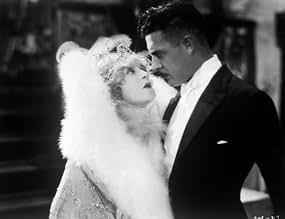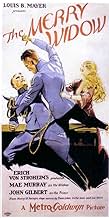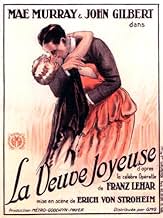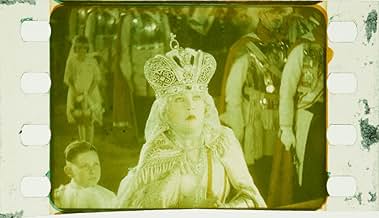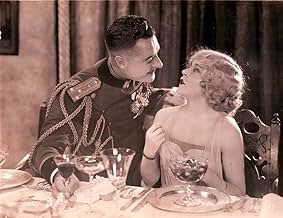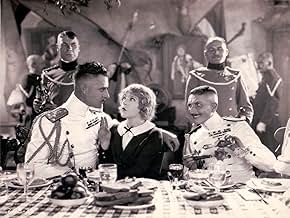CALIFICACIÓN DE IMDb
7.2/10
2.7 k
TU CALIFICACIÓN
Un príncipe debe cortejar a la ahora adinerada bailarina que una vez abandonó, para mantener su dinero en el país y evitar que éste se hunda económicamente.Un príncipe debe cortejar a la ahora adinerada bailarina que una vez abandonó, para mantener su dinero en el país y evitar que éste se hunda económicamente.Un príncipe debe cortejar a la ahora adinerada bailarina que una vez abandonó, para mantener su dinero en el país y evitar que éste se hunda económicamente.
- Dirección
- Guionistas
- Elenco
- Premios
- 3 premios ganados en total
Gertrude Bennett
- Hard-Boiled Virginia
- (sin créditos)
Bernard Berger
- Boy
- (sin créditos)
Sidney Bracey
- Danilo's Footman
- (sin créditos)
Estelle Clark
- French Barber
- (sin créditos)
Albert Conti
- Danilo's Adjutant
- (sin créditos)
D'Arcy Corrigan
- Horatio
- (sin créditos)
Joan Crawford
- Ballroom Dancer
- (sin créditos)
Xavier Cugat
- Orchestra Leader
- (sin créditos)
Anielka Elter
- Blindfolded Musician
- (sin créditos)
Dale Fuller
- Sadoja's Chambermaid
- (sin créditos)
Clark Gable
- Ballroom Dancer
- (sin créditos)
Opiniones destacadas
A romantic Prince from tiny Monteblanco attempts to woo THE MERRY WIDOW who once loved him when she was a poor dancer.
Erich von Stroheim, the Teutonic genius who marched through Hollywood's Silent Days like a conquering general, had his final directorial stint at MGM Studios producing this lavish & brilliant film based on the operetta by Franz Lehár. The visuals are striking, with sets that look like actual locations--a mountaintop village; the Castellano Cathedral; Maxim's in Paris--and the occasional bizarre touch--the blindfolded musicians sharing the Prince's seduction bed, for example--which von Stroheim relished. The acting is flawless, with no need for dialogue. The actors' faces speak all that need be said.
Mae Murray & John Gilbert portray the passionate lovers whom Fate (and the plot) contrives to keep apart so successfully. Miss Murray (she and the director loathed each other) powerfully portrays a street-wise performer who, through a series of heartbreaks, becomes a vastly wealthy woman. Gilbert expertly plays a prince whose charm has always gotten him his way. Their scenes together, most particularly the waltz sequences, fairly blaze with unrequited sensual longing and desire.
While it is entertaining to wonder what von Stroheim would have done with the role, it is difficult to imagine anyone better than Roy D'Arcy as the simpering, lusting, sneering Crown Prince; he is pure villainy personified and his eventual fate is absolutely justified. Josephine Crowell gives a fine performance as the Queen. Tully Marshall, one of von Stroheim's favorite character actors, adds another portrait to his gallery of grotesques, this time playing a crippled baron with a foot fetish.
The wonderful organ score which accompanies the film was arranged & performed by Dennis James.
MGM would tackle THE MERRY WIDOW again nine years later and produce a vastly different film, this time directed by Ernst Lubitsch and starring Maurice Chevalier & Jeanette MacDonald.
Erich von Stroheim, the Teutonic genius who marched through Hollywood's Silent Days like a conquering general, had his final directorial stint at MGM Studios producing this lavish & brilliant film based on the operetta by Franz Lehár. The visuals are striking, with sets that look like actual locations--a mountaintop village; the Castellano Cathedral; Maxim's in Paris--and the occasional bizarre touch--the blindfolded musicians sharing the Prince's seduction bed, for example--which von Stroheim relished. The acting is flawless, with no need for dialogue. The actors' faces speak all that need be said.
Mae Murray & John Gilbert portray the passionate lovers whom Fate (and the plot) contrives to keep apart so successfully. Miss Murray (she and the director loathed each other) powerfully portrays a street-wise performer who, through a series of heartbreaks, becomes a vastly wealthy woman. Gilbert expertly plays a prince whose charm has always gotten him his way. Their scenes together, most particularly the waltz sequences, fairly blaze with unrequited sensual longing and desire.
While it is entertaining to wonder what von Stroheim would have done with the role, it is difficult to imagine anyone better than Roy D'Arcy as the simpering, lusting, sneering Crown Prince; he is pure villainy personified and his eventual fate is absolutely justified. Josephine Crowell gives a fine performance as the Queen. Tully Marshall, one of von Stroheim's favorite character actors, adds another portrait to his gallery of grotesques, this time playing a crippled baron with a foot fetish.
The wonderful organ score which accompanies the film was arranged & performed by Dennis James.
MGM would tackle THE MERRY WIDOW again nine years later and produce a vastly different film, this time directed by Ernst Lubitsch and starring Maurice Chevalier & Jeanette MacDonald.
"Manhattan Follies" dancer Mae Murray (as Sally O'Hara) attracts much male attention while touring the "Kingdom of Monteblanco," especially from sexually aggressive John Gilbert (as Danilo Petrovich) and Roy D'Arcy (as Prince Mirko). Soon, Mr. Gilbert's lunging leers turn to love, and Ms. Murray succumbs to his charms. However, Royal rulers Josephine Crowell (as Queen Milena) and George Fawcett (as King Nikita I) are against Gilbert's proposed marriage. Feeling jilted, Murray marries grotesque banker Tully Marshall (as Sixtus Sadoja), who promptly kicks the bucket. Newly rich, Murray becomes "The Merry Widow" of Paris. There, Mr. D'Arcy seems to win her affections, but Gilbert hasn't given up the courtship.
With this film, big-spending director Erich von Stroheim showed he could make an entertaining and innovative crowd-pleaser; his previous "Greed" (1924) had run over-budget (and over eight hours). But, although they had their hoped-for hit, MGM had also had enough of Mr. Stroheim; still, he departed on a high. "The Merry Widow" also helped rejuvenate Murray's fading career, albeit briefly. The cast is superlative, with D'Arcy essaying one of his most memorable roles. Perfectly representing Stroheim's famous foot fetish, Mr. Marshall is one of silent filmdom's forgotten treasures. Most of all, the flicker put Gilbert on the road to superstardom, which he cemented with a winning performance in "The Big Parade" (later in 1925).
Spotting Clark Gable and Joan Crawford as extras isn't as easy as counting Stroheim's foot references.
******** The Merry Widow (8/26/25) Erich von Stroheim ~ Mae Murray, John Gilbert, Roy D'Arcy, Tully Marshall
With this film, big-spending director Erich von Stroheim showed he could make an entertaining and innovative crowd-pleaser; his previous "Greed" (1924) had run over-budget (and over eight hours). But, although they had their hoped-for hit, MGM had also had enough of Mr. Stroheim; still, he departed on a high. "The Merry Widow" also helped rejuvenate Murray's fading career, albeit briefly. The cast is superlative, with D'Arcy essaying one of his most memorable roles. Perfectly representing Stroheim's famous foot fetish, Mr. Marshall is one of silent filmdom's forgotten treasures. Most of all, the flicker put Gilbert on the road to superstardom, which he cemented with a winning performance in "The Big Parade" (later in 1925).
Spotting Clark Gable and Joan Crawford as extras isn't as easy as counting Stroheim's foot references.
******** The Merry Widow (8/26/25) Erich von Stroheim ~ Mae Murray, John Gilbert, Roy D'Arcy, Tully Marshall
It may be a matter of taste but as much as I like and admire Erich Von Stroheim work before and behind the camera, his reputation as a `genius' doesn't seem justified by the films themselves.
Certainly Merry Widow is filmed with great style and the opulent design is certainly diverting. Also the decision to turn the story from light opera to fairly heavy drama is completely in keeping with Von Stroheim 's own rather cynical outlook. But I find his obsessive dwelling on details can make for a slow and even tedious viewing experience, especially in the first half which seems to spend an inordinate amount of time setting the relationship between the dashing, irreverent but humanist Prince Danilo Petrovich (Gilbert - in wonderful form) and the pompous, tight lipped and distinctly perverse Crown Prince Mirko (Roy D'Arcy).with scenes prolonged far longer than their dramatic weight justifies. Also where the film attempts a lighter tone, the effect is of a concrete soufflé, with every glance and double entendre painfully spelt out.
However this is still a satisfying film as a whole, especially in the second half where we finally have some DRAMA. Here in sequence after sequence we finally start to understand Von Stroheim's reputation as he examines the decaying Royal family under a particularly unflattering microscope. The tryst with the blindfolded musicians is a particularly memorable scene.
Having heard of Mae Murray's terrible treatment of the Von and others in her career, I had a tough time warming to her in this, but I have to admit she gives a great performance as Sally O ' Hara, an innocent who's mistreatment at the hands of the family almost ruins her life. Roy D'Arcy makes an indelible impression as the creepy Mirko, his every gesture filling one with disgust.
But for my money it's Gilbert's work that makes this film worthwhile. One of the very finest of silent actors, the expressiveness of his eyes, the tenderness of his playing and bearing throughout make his character completely convincing and his torment over loosing Sally a felt and poignant loss.
Certainly Merry Widow is filmed with great style and the opulent design is certainly diverting. Also the decision to turn the story from light opera to fairly heavy drama is completely in keeping with Von Stroheim 's own rather cynical outlook. But I find his obsessive dwelling on details can make for a slow and even tedious viewing experience, especially in the first half which seems to spend an inordinate amount of time setting the relationship between the dashing, irreverent but humanist Prince Danilo Petrovich (Gilbert - in wonderful form) and the pompous, tight lipped and distinctly perverse Crown Prince Mirko (Roy D'Arcy).with scenes prolonged far longer than their dramatic weight justifies. Also where the film attempts a lighter tone, the effect is of a concrete soufflé, with every glance and double entendre painfully spelt out.
However this is still a satisfying film as a whole, especially in the second half where we finally have some DRAMA. Here in sequence after sequence we finally start to understand Von Stroheim's reputation as he examines the decaying Royal family under a particularly unflattering microscope. The tryst with the blindfolded musicians is a particularly memorable scene.
Having heard of Mae Murray's terrible treatment of the Von and others in her career, I had a tough time warming to her in this, but I have to admit she gives a great performance as Sally O ' Hara, an innocent who's mistreatment at the hands of the family almost ruins her life. Roy D'Arcy makes an indelible impression as the creepy Mirko, his every gesture filling one with disgust.
But for my money it's Gilbert's work that makes this film worthwhile. One of the very finest of silent actors, the expressiveness of his eyes, the tenderness of his playing and bearing throughout make his character completely convincing and his torment over loosing Sally a felt and poignant loss.
Stroheim's take on the familiar story is filled with his customary pomp and spectacle while never losing sight of the love story at its core. It's something of a slog at over two hours long though, and Gilbert's royal prince comes across as something of a sleaze at times. However, Roy D'Arcy makes a wonderfully hissable villain as the scheming Crown Prince Mirko (a role von Stroheim originally ear-marked for himself).
Superb film by Erich von Stroheim who "personally directed" this lush and romantic blockbuster starring Mae Murray and John Gilbert.
Gilbert plays a European prince who falls for American "danseuse" Murray. Of course his leering cousin the Crown prince (Roy D'Arcy) also has a yen for blonde Murray. The boys clash but Murray prefers Gilbert until he is tricked into jilting her at the altar. She then marries the nation's leading banker (Tully Marshall) who has a foot fetish. He croaks of their wedding night and she becomes "The Merry Widow," a notorious party goer and high liver.
The lovers meet again at Maxim's in Paris where Murray pretends to prefer the oozing D'Arcy. Gilbert gets drunk. On a morning horse ride Murray and D'Arcy come across Gilbert sprawled drunk by the roadside. In a fit, Gilbert strikes the loathsome prince and is challenged to a duel. Murray races to the fog-ridden gunfest but Gilbert has already been shot.
Von Stroheim, notorious for his excesses in GREED is more constrained with THE MERRY WIDOW but still manages some startlingly decadent touches. Murray is fabulous as a the dancer and gets one whole routine to herself a la Martha Grahame as well as the striking and sensual waltz with Gilbert. Gilbert seethes with masculinity and lust for Murray. They are quite a couple. Von Stroheim gives each star maximum close-ups to great effect. Murray has two grand entrances: one in black gown and diamonds for a royal ball; a second all in white fur cape and feathers for her entrance at Maxim's.
The film is highly dramatic, romantic, and sensual but manages touches of humor. A real feast. George Fawcett is the old king; Josephine Crowell is the queen.
In 1925 John Gilbert would have been a shoe in for a best actor Oscar between his performances in THE MERRY WIDOW and THE BIG PARADE. Murray would likely have been a best actress contender. Great film.
Gilbert plays a European prince who falls for American "danseuse" Murray. Of course his leering cousin the Crown prince (Roy D'Arcy) also has a yen for blonde Murray. The boys clash but Murray prefers Gilbert until he is tricked into jilting her at the altar. She then marries the nation's leading banker (Tully Marshall) who has a foot fetish. He croaks of their wedding night and she becomes "The Merry Widow," a notorious party goer and high liver.
The lovers meet again at Maxim's in Paris where Murray pretends to prefer the oozing D'Arcy. Gilbert gets drunk. On a morning horse ride Murray and D'Arcy come across Gilbert sprawled drunk by the roadside. In a fit, Gilbert strikes the loathsome prince and is challenged to a duel. Murray races to the fog-ridden gunfest but Gilbert has already been shot.
Von Stroheim, notorious for his excesses in GREED is more constrained with THE MERRY WIDOW but still manages some startlingly decadent touches. Murray is fabulous as a the dancer and gets one whole routine to herself a la Martha Grahame as well as the striking and sensual waltz with Gilbert. Gilbert seethes with masculinity and lust for Murray. They are quite a couple. Von Stroheim gives each star maximum close-ups to great effect. Murray has two grand entrances: one in black gown and diamonds for a royal ball; a second all in white fur cape and feathers for her entrance at Maxim's.
The film is highly dramatic, romantic, and sensual but manages touches of humor. A real feast. George Fawcett is the old king; Josephine Crowell is the queen.
In 1925 John Gilbert would have been a shoe in for a best actor Oscar between his performances in THE MERRY WIDOW and THE BIG PARADE. Murray would likely have been a best actress contender. Great film.
¿Sabías que…?
- TriviaWhile filming the climactic ballroom scene, Erich von Stroheim noticed an extra whose costume was not adjusted to his liking. He stepped off the high camera platform on which he was standing, fell, and broke his leg. He directed the rest of the film from a reclining chair while his leg healed.
- ErroresA title card reads "a prince has a duty to his country higher then [sic] his duty to himself" - a grammatical error unusual for such a prestigious studio as MGM.
- Citas
Prince Danilo Petrovich: Where the devil did you get these pictures?
Danilo's Adjutant: From my barber--he said he got them in Paris.
- Créditos curiososThe credits state that the film is "personally directed by" Erich von Stroheim.
- Versiones alternativasThe version shown on the Turner Classic Movies (TCM) channel has the musical score arranged by Dennis James and performed by him on a Möller pipe organ. It is shown at a proper silent movie speed and runs 137 minutes.
- ConexionesEdited into Histoire(s) du cinéma: Seul le cinéma (1994)
Selecciones populares
Inicia sesión para calificar y agrega a la lista de videos para obtener recomendaciones personalizadas
- How long is The Merry Widow?Con tecnología de Alexa
Detalles
- Fecha de lanzamiento
- País de origen
- Idioma
- También se conoce como
- Vesela udovica
- Locaciones de filmación
- Productoras
- Ver más créditos de la compañía en IMDbPro
Taquilla
- Presupuesto
- USD 592,000 (estimado)
- Tiempo de ejecución2 horas 17 minutos
- Color
- Mezcla de sonido
- Relación de aspecto
- 1.33 : 1
Contribuir a esta página
Sugiere una edición o agrega el contenido que falta

Principales brechas de datos
By what name was The Merry Widow (1925) officially released in India in English?
Responda
